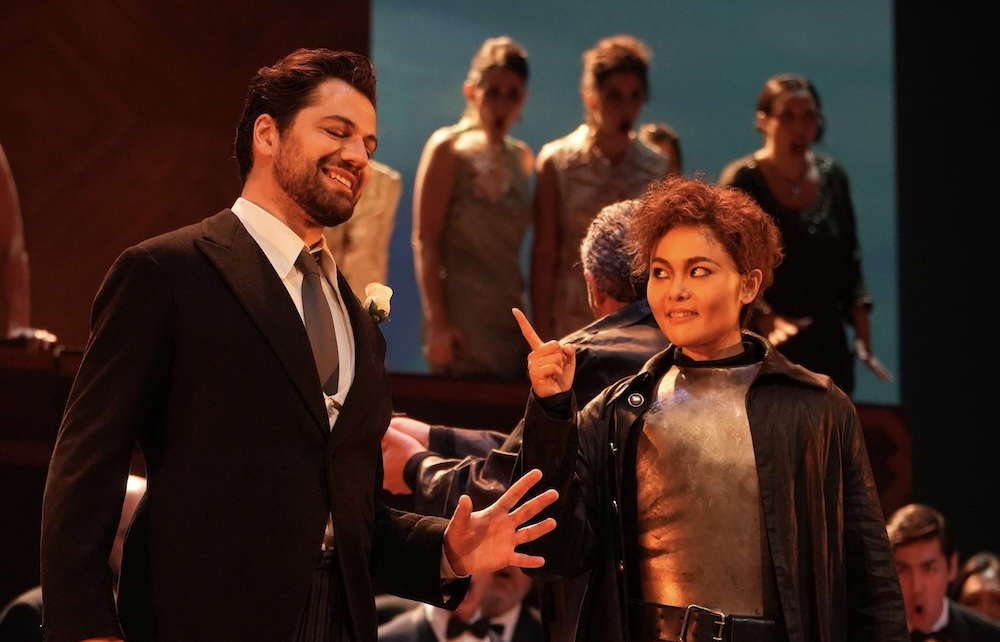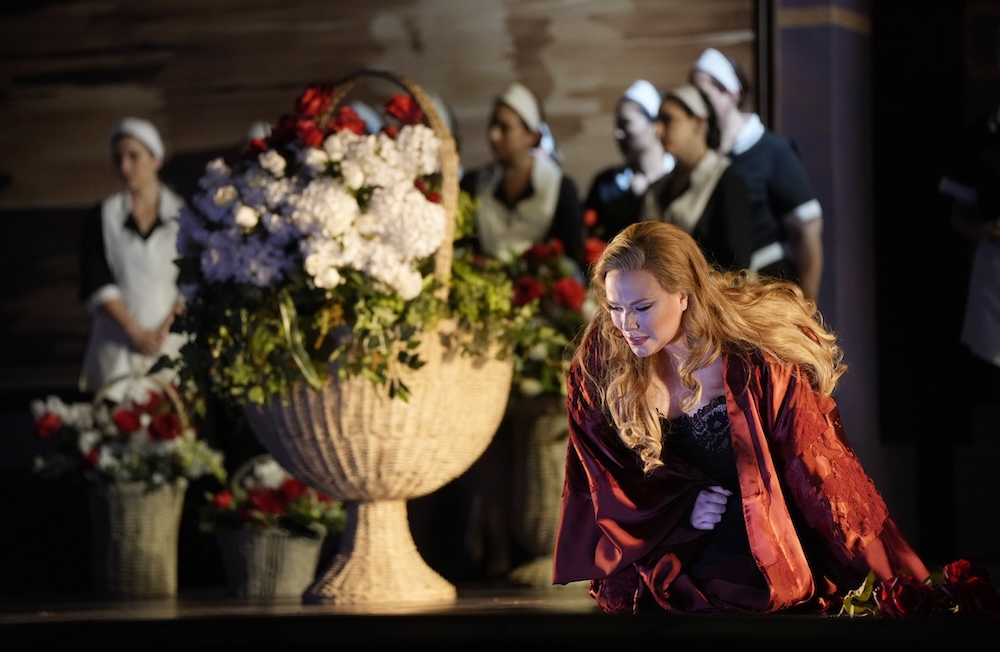Expectations were high in Pesaro just now, not for the new production of Bianca e Falliero by French stage director Jean-Louis Grinda (expectations were low), but of the Rossini Opera Festival’s return to the Parafestival, a sort of community space that closed for an upgrade in 2006. Finally re-opened 18 years later, the theater (serving as well as a basketball court) is now named the Auditorium Scavolini.
While the stage seems kind to singers, the pit offers an unflattering orchestral sound, huge fortes with chorus overburden the hall’s acoustic. The seating is on closely spaced, tiny chairs on dangerous gradations, many seats placed behind glass walls! Public amenities (restrooms) are not even minimal. It is a sad example of adaptive reuse architecture, its only advantage is its proximity to Pesaro’s hotels.
While the 1819 premiere of Rossini’s Bianca e Falliero occurred during the raging Milanese conflict of Romanticism with Classicism, we, as Rossinian classicists, are in Pesaro to celebrate florid singing and old fashioned dramaturgy — love vs. duty! The Rossini Festival’s artistic director Juan Diego Flóres awarded us a splendid cast, but a production that ignored the challenges of translating classical tensions into a current theatrical language.
Bianca e Falliero is a quartet of principal singers — Bianca a soprano (lead photo), Falliero a travesty mezzo soprano (lead photo), Bianca’s father a tenor, her arranged fiancé a bass — who all come together in the grand quartet that precedes Bianca’s triumphant, brilliant final aria “Teco io resto: in te rispetto,” reconciling, finally, her father with her lover.
La Scala librettist Felice Romani concocted a melodrama that laboriously charts the betrothal of Bianca to Capellio, a marriage that will financially save Bianca’s father Contareno, though Bianca’s triumphant warrior lover Falliero had just returned to Venice. Handily Venice had just passed a law condemning to death anyone who consorts with the enemy. Unfortunately the only escape possible from Falliero’s secret meeting with Bianca was through the Spanish ambassador’s house (the Spanish Hapsburgs controlled much of northern Italy in the 17th and 18th centuries).
Bianca was sung by Australian soprano Jessica Pratt, a singer of beautiful voice and impeccable technique, in perfectly matched, pure vocal colors to the Falliero, sung by Japanese mezzo soprano Aya Wakizono who showed magnificently in her Act II showpiece “Tu non sai qual colpo atroce” (Falliero believes that Bianca has actually married Capellio). This care in casting paid off handsomely in the three duets Rossini gifted these matched female voices, the Act I “Sappi che un Dio crudele” melding the voices in exquisite pianos.

The situation resolved itself when Capellio, the arranged fiancé, was moved by Bianca’s testimony to the Venetian senate. He suddenly withdrew all his claims on Bianca and manipulated circumstances to save Falliero’s life. The role was sung by young Georgian bass Georgi Manoshvili in very beautiful, sympathetic, pure bass tones, succumbing from time to time to Capellio’s compulsion to indulge in well executed fioratura.
Bianca’s father Contareno was sung by Russian tenor Dmitry Korchak who raged floridly throughout the opera at his daughter reluctance to heed her filial duty and Falliero’s audacity to love Bianca, upsetting Contareno’s plans. Roles facilitating the action, usually in dry (fortepiano only) recitative, were Priuli sung by Nicolò Donini, Costanza sung by Carmen Buendía, Usciere sung by Claudio Zazzaro and the Cancelliere sung by D’Angelo Díaz.
Stage director Jean-Louis Grinda attempted to involve us in his production by showing us actual, tearjerking footage of Italian suffering during WWII during the opening chorus urging Venice to remain strong in the face of the Spanish threat.
The setting, designed by Rudy Sabounghi, was a wooden box in rich browns often bathed in golden light. The box broke into units that were configured in ever changing ways, pushed by stagehands in formal attire, sometimes revealing a backdrop of a realistic looking lagoon lighted by the moon. Director Grinda effected perfunctory stage movement, often clumsy, for both chorus and principals, the Act ! Finale a primer in how not to stage a large Rossini ensemble.
Costumes, also designed by Mr. Sabounghi, related to WWII evidently, though the Venetian senators were cloaked in rich robes. Particularly annoying was the 30 or so female chorus all dressed as housekeeper maids who joined Bianca in throwing plastic flowers around the stage — clicking as they hit the floor.

It was a retro evening with much fine singing, Roberto Abbado conducting the formidable Orchestra Sinfonia Nazionale della RAI in highly informed Rossinian fashion.
Michael Milenski
Auditorium Scavolini, Pesaro, Italy, August 19, 2024. All photos copyright Amati Bacciardi, courtesy of the Rossini Opera Festival